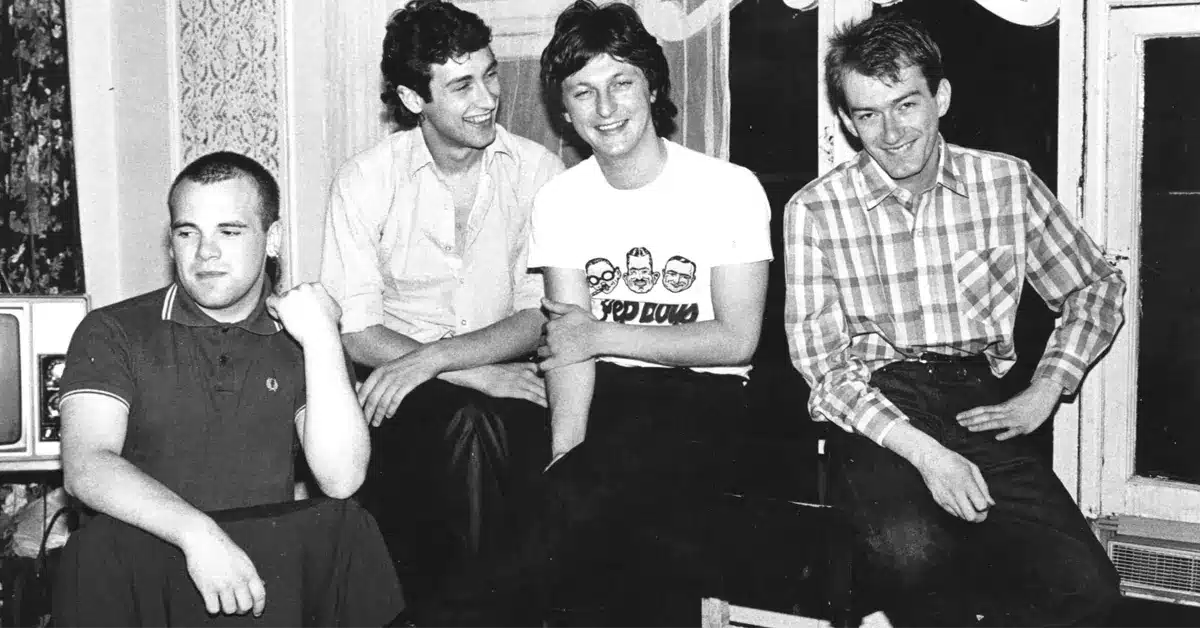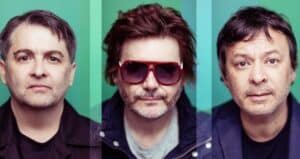Gang of Four: Art Punk’s Intellectual Revolutionaries
Gang of Four was a British post-punk band formed in Leeds in 1976, renowned for their angular guitar riffs, politically charged lyrics, and a sound that fused punk, funk, dub, and art rock. Often cited as one of the most influential bands of the post-punk era, Gang of Four were radical both sonically and ideologically—deconstructing not just music, but also capitalism, consumerism, and modern alienation.
Their music was confrontational, danceable, and fiercely intelligent, laying the groundwork for countless bands across genres, from R.E.M. and Red Hot Chili Peppers to Franz Ferdinand, Bloc Party, and IDLES.
Gang of Four. Formation and Line-Up
- Formed: 1976, Leeds, England
- Original Members:
- Jon King – Vocals, lyrics
- Andy Gill – Guitar, production
- Dave Allen – Bass
- Hugo Burnham – Drums
The name “Gang of Four” references the Chinese political faction from the Cultural Revolution, reflecting the band’s Marxist leanings and interest in ideology, power, and mass culture.
Over time, the band underwent several lineup changes, with Andy Gill serving as the consistent creative force until his death in 2020.

Gang of Four. Musical Style
Gang of Four’s sound is a bold mix of:
- Jarring, staccato guitar work – Andy Gill played more like a rhythm instrument than a melodic one
- Funky, dub-influenced basslines and dance rhythms
- Dry, talk-sung vocals from Jon King
- Lyrical themes of alienation, consumerism, politics, and sexual dynamics
- Influenced by punk’s rawness, funk’s groove, and avant-garde minimalism
They blurred the line between dance music and dissent, making music that challenged the listener intellectually and physically.
Gang of Four. Key Albums
Entertainment! (1979)
Their seminal debut album and one of the most important post-punk records ever made. A powerful blend of sharp political commentary and infectious rhythms.
Highlights:
- “Damaged Goods” – A breakup song that doubles as a critique of commodification
- “Natural’s Not in It” – Capitalism and desire deconstructed
- “At Home He’s a Tourist” – Examines consumer culture and control
- “I Found That Essence Rare”
Solid Gold (1981)
Darker, heavier, and more groove-oriented than the debut. It expands their sound while keeping their thematic bite intact.
Highlights:
- “What We All Want”
- “Paralysed”
- “Outside the Trains Don’t Run on Time”
Songs of the Free (1982)
More melodic and accessible, introducing synths and pop elements. Bassist Dave Allen was replaced by Sara Lee.
Highlights:
- “I Love a Man in a Uniform” – Satirical take on militarism and machismo
- “Call Me Up”
- “We Live as We Dream, Alone”
Hard (1983)
A slicker, funk-driven album, but one that divided critics and fans. Seen as a shift toward mainstream production.
Highlights:
- “Is It Love”
- “Woman Town”
Return the Gift (2005)
A re-recording of early material with updated production. While it lacks the rawness of the originals, it reintroduces the songs to a new generation.
Content (2011)
A late-period return to form featuring original members King and Gill. Dense, pulsing, and introspective.
Highlights:
- “You Don’t Have to Be Mad”
- “It Was Never Gonna Turn Out Too Good”
Happy Now (2019)
The final Gang of Four studio album with Andy Gill before his passing. Still sharp, political, and rhythmically inventive.
Highlights:
- “Paper Thin”
- “Toreador”
- “White Lies”
Gang of Four. Influence and Legacy
Gang of Four’s legacy stretches far and wide:
- Influenced alternative and indie bands like R.E.M., Sonic Youth, Nirvana, and Fugazi
- Helped shape the 2000s post-punk revival, inspiring Franz Ferdinand, Bloc Party, The Rapture, LCD Soundsystem
- Their blend of funk and fury also impacted Red Hot Chili Peppers—Flea has cited them as a major influence
- Seen as intellectual trailblazers, bringing academic theory and political critique into popular music
- Entertainment! is regularly cited among the greatest albums of all time by Rolling Stone, Pitchfork, NME, and more
Gang of Four. Andy Gill’s Legacy
- Andy Gill (1956–2020) was the band’s guitarist, producer, and guiding force
- Known for his choppy, atonal guitar style and radical production approach
- Produced albums for Red Hot Chili Peppers, Killing Joke, Michael Hutchence, and more
- His death marked the end of an era, but Gang of Four’s influence lives on
Where to Start
| Album | Year | Best For |
|---|---|---|
| Entertainment! | 1979 | Their definitive statement—essential post-punk |
| Solid Gold | 1981 | Funkier, darker, equally sharp |
| Songs of the Free | 1982 | Accessible yet biting |
| Content | 2011 | A strong late-era return |
| Return the Gift | 2005 | Great introduction for new listeners |
Final Thoughts
Gang of Four weren’t just a band—they were a manifesto. They tore apart rock’s clichés and rebuilt them with angular guitars, intellectual rigor, and a rebellious groove that made you think while you moved. In a world still grappling with the issues they sang about—power, manipulation, identity, and capitalism—their music remains shockingly relevant.
If you want music that asks questions, challenges norms, and hits hard, Gang of Four should be your next listen.
External Links
https://www.gangoffour7781.com





